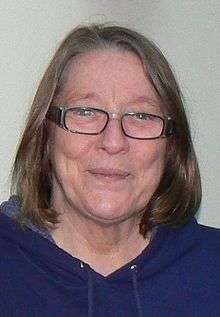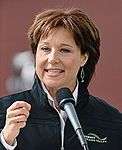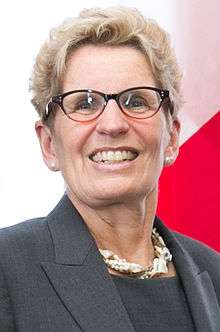List of female first ministers in Canada
A total of twelve women have served, or are serving, as the first minister of a Canadian government. Of these, one was prime minister of the country, eight were premiers of a province and three were premiers of a territory.
Women have been eligible to become premier since they first gained the right to vote, beginning in 1916 in Manitoba and extending to all jurisdictions when Quebec allowed women to vote in 1940 (the Northwest Territories did not allow women to vote until later, but it did not have premiers at the time). Women soon began to be appointed to cabinet positions, starting with Mary Ellen Smith in British Columbia in 1921, but it was not until decades later that women began to serve as leaders of a major party. Hilda Watson became the first woman to lead her party to victory in a general election in 1978. However, since Yukon did not have premiers at the time, and Watson did not win her riding, her successor became the first Government Leader of the Yukon. The first female premier was Rita Johnston in 1991 in British Columbia. Today, every Canadian jurisdiction has had at least one female premier except for Nova Scotia, New Brunswick, Manitoba, and Saskatchewan.
The most female first ministers at one time was six, for 277 days from 11 February to 15 November 2013. These six included the premiers of Canada's four most populated provinces, so during that time approximately 88% of Canadians had a female premier. The longest-serving female premier is Christy Clark, who served as premier of British Columbia for over six years, from 14 March 2011 to 18 July 2017.
Three of the eleven female premiers won the title by defeating an incumbent premier in a general election, and another two earned their positions through consensus government systems that lack political parties. The rest won the title through a party leadership race, although several then went on to win a general election as the incumbent premier.
The two current female first ministers in Canada are Kathleen Wynne (25th Premier of Ontario) and Rachel Notley (17th Premier of Alberta). The tenure of incumbents is accurate as of 21 August 2017.
| Portrait | Name of Premier | Province / Territory | Date Assumed Office | Date Departed Office | Duration | Political Party | Leadership history and electoral Mandates | |
|---|---|---|---|---|---|---|---|---|
| Johnston, RitaRita Johnston | British Columbia | 2 April 1991 | 5 November 1991 | 217 days | British Columbia Social Credit Party | Named as interim party leader—and therefore premier—in 1991 upon the retirement of Premier Bill Vander Zalm. Confirmed as party leader in the 1991 party leadership election. Her party lost power in the following general election. | ||
 |
Cournoyea, NellieNellie Cournoyea | Northwest Territories | 14 November 1991 | 22 November 1995 | 4 years, 8 days | Nonpartisan (consensus government) | Chosen as the premier of the nonpartisan government after the 1991 general election for one term. | |
| Callbeck, CatherineCatherine Callbeck | Prince Edward Island | 25 January 1993 | 9 October 1996 | 3 years, 258 days | Prince Edward Island Liberal Party | Chosen as party leader—and therefore premier—by the 1993 party leadership election upon the retirement of Premier Joe Ghiz. She then led her party to win the 1993 general election. She was the first provincial female party leader to lead a party to election or re-election. She resigned after dropping in the polls. | ||
 |
Campbell, KimKim Campbell | Canada (federal) | 25 June 1993 | 4 November 1993 | 132 days | Progressive Conservative Party of Canada | Chosen as party leader—and therefore prime minister—by the 1993 party leadership election upon the retirement of Prime Minister Brian Mulroney. Her party lost power in the following general election. | |
| Duncan, PatPat Duncan | Yukon | 5 June 2000 | 5 November 2002 | 2 years, 153 days | Yukon Liberal Party | Named party leader while her party was the third party opposition in 1998. Became leader of the opposition partway through the 29th Yukon Legislature. Led her party to victory and thereby became premier in the 2000 general election. She was the first woman to defeat a sitting premier. Her party lost power in the following general election. | ||
 |
Aariak, EvaEva Aariak | Nunavut | 14 November 2008 | 15 November 2013 | 5 years, 1 day | Nonpartisan (consensus government) | Chosen as the premier of the nonpartisan government after the 2008 general election for one term. | |
 |
Dunderdale, KathyKathy Dunderdale | Newfoundland and Labrador | 3 December 2010 | 24 January 2014 | 3 years, 52 days | Progressive Conservative Party of Newfoundland and Labrador | Chosen as interim party leader—and therefore premier—in 2010 upon the retirement of Premier Danny Williams after serving as his deputy premier. Her party leadership was confirmed at the 2011 party leadership election. She then led her party to victory in the 2011 general election. She resigned after dropping in the polls. | |
 |
Clark, ChristyChristy Clark | British Columbia | 14 March 2011 | 18 July 2017 | 6 years, 126 days | British Columbia Liberal Party | Chosen as party leader—and therefore premier— by the 2011 party leadership election upon the retirement of Premier Gordon Campbell. Led her party to victory in the 2013 general election. She won a plurality of seats in the 2017 general election, but immediately lost a confidence vote and resigned. | |
 |
Redford, AlisonAlison Redford | Alberta | 7 October 2011 | 23 March 2014 | 2 years, 167 days | Progressive Conservative Association of Alberta | Chosen as party leader—and therefore premier— by the 2011 party leadership election upon the retirement of Premier Ed Stelmach. Then led her party to victory in the 2012 general election. She resigned after dropping in the polls.[1][2] | |
 |
Marois, PaulinePauline Marois | Quebec | 19 September 2012 | 23 April 2014 | 1 year, 216 days | Parti Québécois | Chosen as party leader while her party was the third party opposition by the 2007 party leadership election. Led her party to become the official opposition in the 2008 general election and later led her party to victory—and thereby became premier—in the 2012 general election. She was the first female party leader to defeat a sitting premier in a province. Her party lost power in the following general election. | |
 |
Wynne, KathleenKathleen Wynne | Ontario | 11 February 2013 | Incumbent | 4 years, 191 days | Ontario Liberal Party | Chosen as party leader—and therefore premier—by the 2013 party leadership election upon the retirement of Premier Dalton McGuinty. Then led her party to victory in the 2014 general election. | |
 |
Notley, RachelRachel Notley | Alberta | 24 May 2015 | Incumbent | 2 years, 89 days | Alberta New Democratic Party | Chosen as party leader while her party was the fourth party opposition by the 2014 party leadership election. Led her party to victory—and thereby became premier—in the 2015 general election. | |
See also
- Women in Canadian politics
- List of Canadian women government ministers
- List of female viceroys in Canada
- List of elected or appointed female heads of state
- List of Asian-Canadian First Ministers
- List of female prime ministers
References
- ↑ Commisso, Christina (March 19, 2014). "Alison Redford's approval rating plunges to 18 per cent: poll". CTV News. Retrieved May 7, 2014.
- ↑ Mason, Gary (March 19, 2014). "Party infighting, low poll numbers led to Alberta Premier's resignation". The Globe and Mail. Retrieved May 7, 2014.